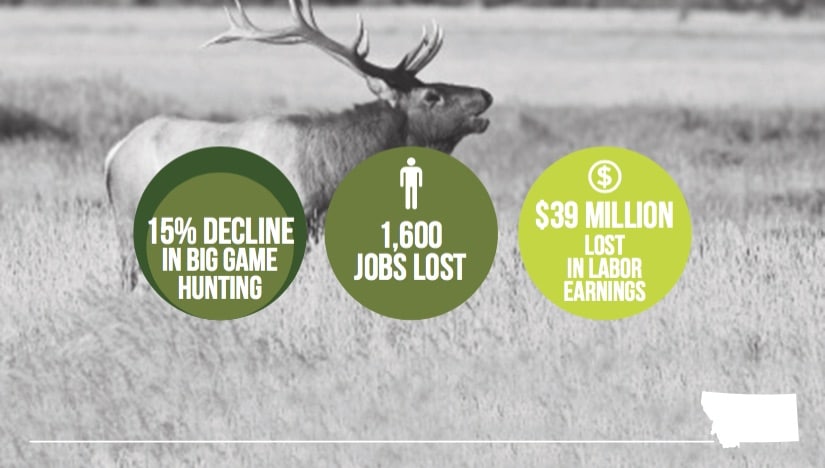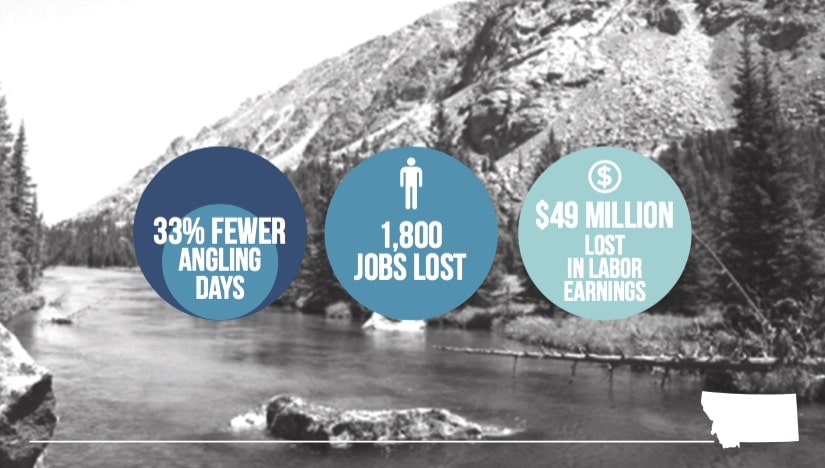Climate Change Impacts Montana
Climate change endangers Montana's outdoor heritage and economy
11,000 jobs and $281 million income at stake due to stream closures, lost hunting opportunities, wildfires, and reduced snowpack.
The droughts, fires and floods associated with climate change will have profound negative impacts on the Treasure State’s world-class outdoor opportunities, which will ripple through the entire economy, according to a new study released today by the Montana Wildlife Federation.
Reduced snowpack, diminished flows in streams and rivers, hotter summers, and more extreme weather events brought on by climate change threaten to radically change Montana’s outdoor traditions, causing job losses and diminished incomes.
MWF commissioned Thomas and Donovan Power of Power Consulting to develop the report to look into the economic realities of climate change on the state of Montana, if we continue to do nothing to curb greenhouse gas pollution. Thomas Power is professor emeritus from University of Montana, who chaired the economics department for 30 years. Donovan Power is a geologist who focuses on climate change.
Scientific data have made it abundantly clear that pollution from smokestacks, tailpipes, and other sources is causing an unprecedented warming of the earth’s atmosphere. The scientific consensus is that if we continue to do nothing to curb this type of pollution, Montana will see a temperature rise of 4-5 degrees F by 2055. Scientific research says that this will result in warmer, drier summers, increased wildfires, reduced snowpack, and a host of impacts to fish and wildlife habitat. Powers’ research found these changes ultimately threaten 11,000 jobs and $281 million in labor earnings in Montana’s outdoor economy by 2050.
“Climate change is a threat to Montana’s wildlife, our hunting and fishing heritage, and ultimately our outdoor economy,” said Montana Wildlife Federation Executive Director Dave Chadwick. “Now is the time to reign in greenhouse gas pollution, to limit the damage done not only to our way of life, but to that of our children and grandchildren.”
“Last summer’s low stream flows and Hoot Owl closures show what we can expect in a hotter, drier future,” said Scott Nicolarsen, owner of Montana Topwater Fly Fishing Outfitters in Missoula. “My business, and other businesses around Montana, are on the line if we don’t do something about global warming pollution.”
“With current warming trends threatening the length of our season, losing the Christmas Holiday ski season due to a lack of fall snowpack can be devastating to our industry and our entire winter tourism economy, on which many people depend on to live,” said Doug Wales, Marketing Director for Bridger Bowl. “Snow is our ski industry, as well as that for snowmobiling. We can’t ignore the scientific evidence of humanity’s impact on climate change that threatens our livelihood.”
Decades of scientific research indicates that climate change is altering Montana’s natural resources in many ways, including:
• Less snowpack in the high country means less runoff for our streams, the runoff will come earlier, and streams will run warmer. Reduced angling will mean 1,800 lost jobs and $49 million in lost labor earnings.
• Wildlife will stay in the high country for longer periods both because they will seek cooler temperatures there and they will not be pushed down by early winter snowfalls. Reduced hunting will mean 1,600 lost jobs and $39 million in lost labor earnings.
• Skiers and snowmobilers will face shorter, warmer seasons with less snowpack. Ski areas will be forced to make more snow. Snowmobilers will be forced to travel farther and higher to find favorable conditions. Reduced snow recreation will mean about 1,500 lost jobs and $37 million in lost labor earnings.
• Visitors to Montana and residents alike will face hotter summers and a significantly longer fire season. Glacier and Yellowstone national parks will see a dramatic decrease in visitation. Reduced park visitation will mean the loss of 3,300 jobs and $94 million in labor earnings.
• Montana’s world-class wildlife watching will become more difficult due to wildfire, reduced habitat, and changes in animal behavior. Reduced wildlife watching will mean the loss of 2,800 jobs and $61 million in income.
• Wildfires in Montana are predicted to double by 2050. At the same time, more and more Montanans are projected to build their homes on the privately owned land adjacent to public forests, putting development and wildfire on a collision course. This will result in potential annual losses of 227 homes worth $53 million.
“Protecting Montana’s natural heritage from the effects of climate change now will save billions of dollars in hard economic costs to be borne by Montanans today and long into the future,” said Chadwick.
See the full report: Impact of Climate Change on the Montana Outdoor Economy Dec 2015 – Final Report
Feeling wonky? Listen to the telepresser for the report:
Impact of Climate Change on Montana’s Outdoor Economy Telepresser Recording
See the telepresser as a pdf: Slide Deck Power Report
Check out the infographics: Climate Change Threatens Montana’s Outdoor Economy
At A Glance
Climate change threatens to radically change Montana’s outdoor traditions.
11,000 jobs and $281 million income at stake due to stream closures, lost hunting opportunities, wildfires, and reduced snowpack.
Less snowpack in the high country means less runoff for our streams, the runoff will come earlier, and streams will run warmer.
Our Work
Our Work
Latest Climate Impact News
Make A Difference
Your generous donation supports Montana Wildlife Federation’s work conserving our wildlife, wild places, and hunting and angling opportunities for current and future generations.




